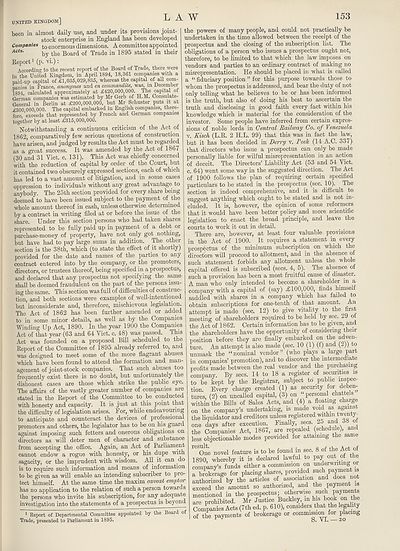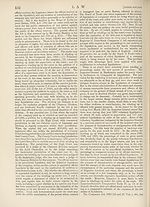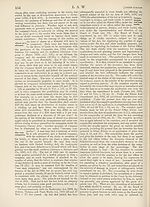New volumes of the Encyclopædia Britannica > Volume 30, K-MOR
(177) Page 153
Download files
Complete book:
Individual page:
Thumbnail gallery: Grid view | List view

UNITED KINGDOM]
LAW
153
been in almost daily use, and under its provisions joint-
stock enterprise in England has been developed
Companies to enormous dimensions. A committee appointed
Acts' by the Board of Trade in 1895 stated in their
Report1 (p. vi.) :
According to the recent report of the Board of Trade, there were
in the United Kingdom, in April 1894, 18,361 companies with a
paid-up capital of £1,035,029,835, whereas the capital of all com-
nanies in France, anonymes and en commandite, was, m December
1894 calculated approximately at £420,000,000. The capital of
German companies was estimated by Mr Gerb of H.M. Consulate-
General in Berlin at £200,000,000, but Mr Schuster puts it at
£300 000 000. The capital embarked in English companies, there¬
fore 'exceeds that represented by French and German companies
together by at least £315,000,000.
Notwithstanding a continuous criticism of the Act of
1862, comparatively few serious questions of construction
have arisen, and judged by results the Act must be regarded
as a great success. It was amended by the Act of 1867
(30 and 31 Yict. c. 131). This Act was chiefly concerned
with the reduction of capital by order of the Court, but
it contained two obscurely expressed sections, each of which
has led to a vast amount of litigation, and in some cases
oppression to individuals without any great advantage to
anybody. The 25th section provided for every share being
deemed to have been issued subject to the payment of( the
whole amount thereof in cash, unless otherwise determined
by a contract in writing filed at or before the issue of the
share. Under this section persons who had taken shares
represented to be fully paid up in payment of a debt or
purchase-money of property, have not only got nothing,
but have had to pay large sums in addition. ^ The other
section is tlie 38th, which (to state the eftect of it shortly)
provided for the date and names of the parties to any
contract entered into by the company, or the promoters,
directors, or trustees thereof, being specified in a prospectus,
and declared that any prospectus not specifying the same
shall be deemed fraudulent on the part of the persons issu¬
ing the same. This section was full of difficulties of construc¬
tion, and both sections were examples of well-intentioned
but inconsiderate and, therefore, mischievous legislation.
The Act of 1862 has been further amended or added
to in some minor details, as well as by the Companies
Winding Up Act, 1890. In the year 1900 the Companies
Act of that year (63 and 64 Yict. c. 48) was passed. This
Act was founded on a proposed Bill scheduled to the
Report of the Committee of 1895 already referred to, and
was designed to meet some of the more flagrant abuses
which have been found to attend the formation and man¬
agement of joint-stock companies. That such abuses too
frequently exist there is no doubt, but unfortunately the
dishonest cases are those which strike the public eye.
The affairs of the vastly greater number of companies are
stated in the Report of the Committee to be conducted
with honesty and capacity. It is just at this point that
the difficulty of legislation arises. For, while endeavouring
to anticipate and counteract the devices of professional
promoters and others, the legislator has to be on his guard
against imposing such fetters and onerous obligations on
directors as will deter men of character and substance
from accepting the office. Again, an Act of Parliament
cannot endow a rogue with honesty, or his dupe with
sagacity, or the imprudent with wisdom. All it can do
is to require such information and means of information
to be given as will enable an intending subscriber to pro¬
tect himself. At the same time the maxim caveat emptor
has no application to the relation of such a person towards
the persons who invite his subscription, for any adequate
investigation into the statements of a prospectus is beyond
1 Report of Departmental Committee appointed by the Board of
Trade, presented to Parliament in 1895.
the powers of many people, and could not practically be
undertaken in the time allowed between the receipt of the
prospectus and the closing of the subscription list. The
obligations of a person who issues a prospectus ought not,
therefore, to be limited to that which the law imposes on
vendors and parties to an ordinary contract of making no
misrepresentation. He should be placed in what is called
a “ fiduciary position ” for this purpose towards those to
whom the prospectus is addressed, and bear the duty of not
only telling what he believes to be or has been informed
is the truth, but also of doing his best to ascertain the
truth and disclosing in good faith every fact within his
knowledge which is material for the consideration of the
investor. Some people have inferred from certain expres¬
sions of noble lords in Central Railway Co. of Venezuela
v. Kisch (L.R. 2 H.L. 99) that this was in fact the law,
but it has been decided in Derry v. Feek (14 A.C. 337)
that directors who issue a prospectus can only be made
personally liable for wilful misrepresentation in an action
of deceit. The Directors’ Liability Act (53 and 54 Yict.
c. 64) went some way in the suggested direction. The Act
of 1900 follows the plan of requiring certain specified
particulars to be stated in the prospectus (sec. 10). The
section is indeed comprehensive, and it is difficult to
suggest anything which ought to be stated and is not in¬
cluded. It is, however, the opinion of some reformers
that it would have been better policy and more scientific
legislation to enact the broad principle, and leave the
courts to work it out in detail.
There are, however, at least four valuable provisions
in the Act of 1900. It requires a statement in every
prospectus of the minimum subscription on which the
directors will proceed to allotment, and in the absence of
such statement forbids any allotment unless the whole
capital offered is subscribed (secs. 4, 5). The absence of
such a provision has been a most fruitful cause of disastei.
A man who only intended to become a shareholder in a
company with a capital of (say) <£100,000, finds himself
saddled with shares in a company which has failed to
obtain subscriptions for one-tenth of that amount. An
attempt is made (sec. 12) to give vitality to the first
meeting of shareholders required to be held by sec. 29 ot
the Act of 1862. Certain information has to be given, and
the shareholders have the opportunity of considering their
position before they are finally embarked on the adven¬
ture. An attempt is also made (sec. 10 (1) (f) and (2)) to
unmask the “nominal vendor” (who plays a large part
in companies’ promotion), and to discover the intermediate
profits made between the real vendor and the purchasing
company. By secs. 14 to 18 a register of securities is
to be kept by the Registrar, subject to public inspec¬
tion. Every charge created (1) as security for deben¬
tures, (2) on uncalled capital, (3) on “personal chattels
within the Bills of Sales Acts, and (4) a floating charge
on the company’s undertaking, is made void as agains
the liquidator and creditors unless registered within twenty
one days after execution. Finally, secs. 25 and 38 o
the Companies Act, 1867, are repealed (schedule),
less objectionable modes provided for attaining the same
^One novel feature is to be found in sec. 8 of the Act of
1890, whereby it is declared lawful to pay out of the
company’s funds either a commission on underwriting or
a brokerage for placing shares, provided such payment
authorized by the articles of association and does not
exceed the amount so authorized, and the payment is
mentioned in the prospectus; otherwise such payments
are prohibited. Mr Justice Buckley, m his book on the
Companies Acts (7th ed. p. 610), considers that the legality
of the payments of brokerage or commi^sion^ for placing
LAW
153
been in almost daily use, and under its provisions joint-
stock enterprise in England has been developed
Companies to enormous dimensions. A committee appointed
Acts' by the Board of Trade in 1895 stated in their
Report1 (p. vi.) :
According to the recent report of the Board of Trade, there were
in the United Kingdom, in April 1894, 18,361 companies with a
paid-up capital of £1,035,029,835, whereas the capital of all com-
nanies in France, anonymes and en commandite, was, m December
1894 calculated approximately at £420,000,000. The capital of
German companies was estimated by Mr Gerb of H.M. Consulate-
General in Berlin at £200,000,000, but Mr Schuster puts it at
£300 000 000. The capital embarked in English companies, there¬
fore 'exceeds that represented by French and German companies
together by at least £315,000,000.
Notwithstanding a continuous criticism of the Act of
1862, comparatively few serious questions of construction
have arisen, and judged by results the Act must be regarded
as a great success. It was amended by the Act of 1867
(30 and 31 Yict. c. 131). This Act was chiefly concerned
with the reduction of capital by order of the Court, but
it contained two obscurely expressed sections, each of which
has led to a vast amount of litigation, and in some cases
oppression to individuals without any great advantage to
anybody. The 25th section provided for every share being
deemed to have been issued subject to the payment of( the
whole amount thereof in cash, unless otherwise determined
by a contract in writing filed at or before the issue of the
share. Under this section persons who had taken shares
represented to be fully paid up in payment of a debt or
purchase-money of property, have not only got nothing,
but have had to pay large sums in addition. ^ The other
section is tlie 38th, which (to state the eftect of it shortly)
provided for the date and names of the parties to any
contract entered into by the company, or the promoters,
directors, or trustees thereof, being specified in a prospectus,
and declared that any prospectus not specifying the same
shall be deemed fraudulent on the part of the persons issu¬
ing the same. This section was full of difficulties of construc¬
tion, and both sections were examples of well-intentioned
but inconsiderate and, therefore, mischievous legislation.
The Act of 1862 has been further amended or added
to in some minor details, as well as by the Companies
Winding Up Act, 1890. In the year 1900 the Companies
Act of that year (63 and 64 Yict. c. 48) was passed. This
Act was founded on a proposed Bill scheduled to the
Report of the Committee of 1895 already referred to, and
was designed to meet some of the more flagrant abuses
which have been found to attend the formation and man¬
agement of joint-stock companies. That such abuses too
frequently exist there is no doubt, but unfortunately the
dishonest cases are those which strike the public eye.
The affairs of the vastly greater number of companies are
stated in the Report of the Committee to be conducted
with honesty and capacity. It is just at this point that
the difficulty of legislation arises. For, while endeavouring
to anticipate and counteract the devices of professional
promoters and others, the legislator has to be on his guard
against imposing such fetters and onerous obligations on
directors as will deter men of character and substance
from accepting the office. Again, an Act of Parliament
cannot endow a rogue with honesty, or his dupe with
sagacity, or the imprudent with wisdom. All it can do
is to require such information and means of information
to be given as will enable an intending subscriber to pro¬
tect himself. At the same time the maxim caveat emptor
has no application to the relation of such a person towards
the persons who invite his subscription, for any adequate
investigation into the statements of a prospectus is beyond
1 Report of Departmental Committee appointed by the Board of
Trade, presented to Parliament in 1895.
the powers of many people, and could not practically be
undertaken in the time allowed between the receipt of the
prospectus and the closing of the subscription list. The
obligations of a person who issues a prospectus ought not,
therefore, to be limited to that which the law imposes on
vendors and parties to an ordinary contract of making no
misrepresentation. He should be placed in what is called
a “ fiduciary position ” for this purpose towards those to
whom the prospectus is addressed, and bear the duty of not
only telling what he believes to be or has been informed
is the truth, but also of doing his best to ascertain the
truth and disclosing in good faith every fact within his
knowledge which is material for the consideration of the
investor. Some people have inferred from certain expres¬
sions of noble lords in Central Railway Co. of Venezuela
v. Kisch (L.R. 2 H.L. 99) that this was in fact the law,
but it has been decided in Derry v. Feek (14 A.C. 337)
that directors who issue a prospectus can only be made
personally liable for wilful misrepresentation in an action
of deceit. The Directors’ Liability Act (53 and 54 Yict.
c. 64) went some way in the suggested direction. The Act
of 1900 follows the plan of requiring certain specified
particulars to be stated in the prospectus (sec. 10). The
section is indeed comprehensive, and it is difficult to
suggest anything which ought to be stated and is not in¬
cluded. It is, however, the opinion of some reformers
that it would have been better policy and more scientific
legislation to enact the broad principle, and leave the
courts to work it out in detail.
There are, however, at least four valuable provisions
in the Act of 1900. It requires a statement in every
prospectus of the minimum subscription on which the
directors will proceed to allotment, and in the absence of
such statement forbids any allotment unless the whole
capital offered is subscribed (secs. 4, 5). The absence of
such a provision has been a most fruitful cause of disastei.
A man who only intended to become a shareholder in a
company with a capital of (say) <£100,000, finds himself
saddled with shares in a company which has failed to
obtain subscriptions for one-tenth of that amount. An
attempt is made (sec. 12) to give vitality to the first
meeting of shareholders required to be held by sec. 29 ot
the Act of 1862. Certain information has to be given, and
the shareholders have the opportunity of considering their
position before they are finally embarked on the adven¬
ture. An attempt is also made (sec. 10 (1) (f) and (2)) to
unmask the “nominal vendor” (who plays a large part
in companies’ promotion), and to discover the intermediate
profits made between the real vendor and the purchasing
company. By secs. 14 to 18 a register of securities is
to be kept by the Registrar, subject to public inspec¬
tion. Every charge created (1) as security for deben¬
tures, (2) on uncalled capital, (3) on “personal chattels
within the Bills of Sales Acts, and (4) a floating charge
on the company’s undertaking, is made void as agains
the liquidator and creditors unless registered within twenty
one days after execution. Finally, secs. 25 and 38 o
the Companies Act, 1867, are repealed (schedule),
less objectionable modes provided for attaining the same
^One novel feature is to be found in sec. 8 of the Act of
1890, whereby it is declared lawful to pay out of the
company’s funds either a commission on underwriting or
a brokerage for placing shares, provided such payment
authorized by the articles of association and does not
exceed the amount so authorized, and the payment is
mentioned in the prospectus; otherwise such payments
are prohibited. Mr Justice Buckley, m his book on the
Companies Acts (7th ed. p. 610), considers that the legality
of the payments of brokerage or commi^sion^ for placing
Set display mode to:
![]() Universal Viewer |
Universal Viewer | ![]() Mirador |
Large image | Transcription
Mirador |
Large image | Transcription
Images and transcriptions on this page, including medium image downloads, may be used under the Creative Commons Attribution 4.0 International Licence unless otherwise stated. ![]()
| Encyclopaedia Britannica > New volumes of the Encyclopædia Britannica > Volume 30, K-MOR > (177) Page 153 |
|---|
| Permanent URL | https://digital.nls.uk/193569802 |
|---|
| Attribution and copyright: |
|
|---|---|
| Shelfmark | EB.18 |
|---|---|
| Description | Ten editions of 'Encyclopaedia Britannica', issued from 1768-1903, in 231 volumes. Originally issued in 100 weekly parts (3 volumes) between 1768 and 1771 by publishers: Colin Macfarquhar and Andrew Bell (Edinburgh); editor: William Smellie: engraver: Andrew Bell. Expanded editions in the 19th century featured more volumes and contributions from leading experts in their fields. Managed and published in Edinburgh up to the 9th edition (25 volumes, from 1875-1889); the 10th edition (1902-1903) re-issued the 9th edition, with 11 supplementary volumes. |
|---|---|
| Additional NLS resources: |
|

